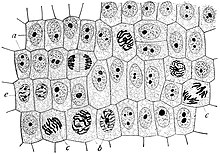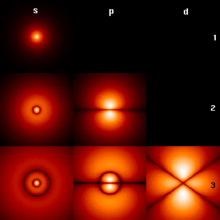Branches of natural science[edit]
Biology[edit]
This field encompasses a set of disciplines that examines phenomena related to living organisms. The scale of study can range from sub-component biophysics up to complex ecologies. Biology is concerned with the characteristics, classification and behaviors of organisms, as well as how species were formed and their interactions with each other and the environment.
The biological fields of botany, zoology, and medicine date back to early periods of civilization, while microbiology was introduced in the 17th century with the invention of the microscope. However, it was not until the 19th century that biology became a unified science. Once scientists discovered commonalities between all living things, it was decided they were best studied as a whole.
Some key developments in biology were the discovery of genetics; evolution through natural selection; the germ theory of disease and the application of the techniques of chemistry and physics at the level of the cell or organic molecule.
Modern biology is divided into subdisciplines by the type of organism and by the scale being studied. Molecular biology is the study of the fundamental chemistry of life, while cellular biology is the examination of the cell; the basic building block of all life. At a higher level, anatomyand physiology looks at the internal structures, and their functions, of an organism, while ecology looks at how various organisms interrelate.
Chemistry[edit]
Constituting the scientific study of matter at the atomic and molecular scale, chemistry deals primarily with collections of atoms, such as gases, molecules, crystals, and metals. The composition, statistical properties, transformations and reactions of these materials are studied. Chemistry also involves understanding the properties and interactions of individual atoms and molecules for use in larger-scale applications.
Most chemical processes can be studied directly in a laboratory, using a series of (often well-tested) techniques for manipulating materials, as well as an understanding of the underlying processes. Chemistry is often called "the central science" because of its role in connecting the other natural sciences.
Early experiments in chemistry had their roots in the system of Alchemy, a set of beliefs combining mysticism with physical experiments. The science of chemistry began to develop with the work of Robert Boyle, the discoverer of gas, and Antoine Lavoisier, who developed the theory of the Conservation of mass.
The discovery of the chemical elements and atomic theory began to systematize this science, and researchers developed a fundamental understanding of states of matter, ions, chemical bonds and chemical reactions. The success of this science led to a complementary chemical industry that now plays a significant role in the world economy.
Physics[edit]
Physics embodies the study of the fundamental constituents of the universe, the forces and interactions they exert on one another, and the results produced by these interactions. In general, physics is regarded as the fundamental science, because all other natural sciences use and obey the principles and laws set down by the field. Physics relies heavily on mathematics as the logical framework for formulation and quantification of principles.
The study of the principles of the universe has a long history and largely derives from direct observation and experimentation. The formulation of theories about the governing laws of the universe has been central to the study of physics from very early on, with philosophygradually yielding to systematic, quantitative experimental testing and observation as the source of verification. Key historical developments in physics include Isaac Newton's theory of universal gravitation and classical mechanics, an understanding of electricity and its relation to magnetism, Einstein's theories of special and general relativity, the development of thermodynamics, and the quantum mechanical model of atomic and subatomic physics.
The field of physics is extremely broad, and can include such diverse studies as quantum mechanics and theoretical physics, applied physicsand optics. Modern physics is becoming increasingly specialized, where researchers tend to focus on a particular area rather than being "universalists" like Isaac Newton, Albert Einstein and Lev Landau, who worked in multiple areas.
Astronomy[edit]
This discipline is the science of celestial objects and phenomena that originate outside the Earth's atmosphere. It is concerned with the evolution, physics, chemistry, meteorology, and motion of celestial objects, as well as the formation and development of the universe.
Astronomy includes the examination, study and modeling of stars, planets, comets, galaxies and the cosmos. Most of the information used by astronomers is gathered by remote observation, although some laboratory reproduction of celestial phenomena has been performed (such as the molecular chemistry of the interstellar medium).
While the origins of the study of celestial features and phenomena can be traced back to antiquity, the scientific methodology of this field began to develop in the middle of the 17th century. A key factor was Galileo's introduction of the telescope to examine the night sky in more detail.
The mathematical treatment of astronomy began with Newton's development of celestial mechanics and the laws of gravitation, although it was triggered by earlier work of astronomers such as Kepler. By the 19th century, astronomy had developed into a formal science, with the introduction of instruments such as the spectroscope and photography, along with much-improved telescopes and the creation of professional observatories.
Earth science[edit]
Earth science (also known as geoscience), is an all-embracing term for the sciences related to the planet Earth, including geology, geophysics, hydrology, meteorology, physical geography, oceanography, and soil science.
Although mining and precious stones have been human interests throughout the history of civilization, the development of the related sciences of economic geology and mineralogydid not occur until the 18th century. The study of the earth, particularly palaeontology, blossomed in the 19th century. The growth of other disciplines, such as geophysics, in the 20th century led to the development of the theory of plate tectonics in the 1960s, which has had a similar effect on the Earth sciences as the theory of evolution had on biology. Earth sciences today are closely linked to petroleum and mineral resources, climate research and to environmental assessment and remediation.
Atmospheric sciences[edit]
Though sometimes considered in conjunction with the earth sciences, due to the independent development of its concepts, techniques and practices and also the fact of it having a wide range of sub disciplines under its wing, the atmospheric sciences is also considered a separate branch of natural science. This field studies the characteristics of different layers of the atmosphere from ground level to the edge of the time. The timescale of study also varies from days to centuries. Sometimes the field also includes the study of climatic patterns on planets other than earth.
Oceanography[edit]
The serious study of oceans began in the early to mid-20th century. As a field of natural science, it is relatively young but stand-alone programs offer specializations in the subject. Though some controversies remain as to the categorization of the field under earth sciences, interdisciplinary sciences or as a separate field in its own right, most modern workers in the field agree that it has matured to a state that it has its own paradigms and practices. As such a big family of related studies spanning every aspect of the oceans is now classified under this field.




No comments:
Post a Comment